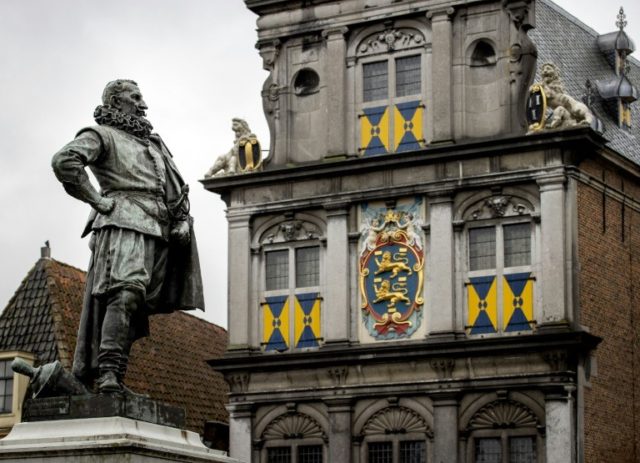Hoorn (Netherlands) (AFP) – The statue of a Dutch 17th century colonialist has become a flashpoint for the debate in the Netherlands on its past of slavery and colonisation in the wake of the Black Lives Matter protests.
For some, the sculpture of Jan Pieterszoon Coen, a key official in the Dutch East India Company considered a national hero for colonising what is now Indonesia, is a memorial to the Dutch “Golden Age”.
Traditionalists, like populist eurosceptic leader Thierry Baudet, have laid flowers at the foot of the statue in the port town of Hoorn to show support after several statues of historical figures were damaged in the Netherlands.
But opponents would rather throw it into the North Sea, condemning it to the same fate as others around the world after the death of unarmed black man George Floyd in police custody in the United States.
“History is history,” said Freddie Blaauw, 62, a visitor to Hoorn from the northern city of Groningen.
“You have to leave these statues in peace, and look to the future,” said his wife Gea, 60.
Hoorn was one of the main bases of the Dutch East India Company, whose domination of the spice trade effectively funded the Golden Age of the 16th and 17th centuries, backed by Dutch maritime supremacy.
The riches amassed by traders also fuelled an unprecedented cultural boom that produced great artists such as Rembrandt and created the canalside wonders of Amsterdam.
‘Thousands of deaths’
“For centuries, Coen was honoured as the founder of the Dutch East Indies,” said Gert Oostindie, a historian and professor of colonial history at Leiden University, adding that it was “terribly important for this country.”
But now, Oostindie told AFP, “the legitimacy of colonialism has evaporated.”
While the Netherlands is often seen abroad as a liberal and multicultural society at ease with itself, it has long wrestled with problems of racism and, increasingly, the legacy of its colonial past.
That has now become more pronounced as the Black Lives Matter movement spreads around the globe.
In June protesters sprayed the words “killer” and thief” on the statue of 17th century admiral Piet Hein in the port city of Rotterdam, while red hands were daubed on an art centre named after Hein’s fleet captain, Witte de With.
Now the status of Jan Pieterszoon Coen, whose stone effigy stands in the centre of Hoorn with its sword aloft and a stern look on his face, is no longer assured.
Several clashes between defenders and opponents of the statue have erupted recently in this town of 70,000 people, which gave its name to Cape Horn, the southernmost point of South America.
As governor of the Dutch East Indies from 1618, “Coen was a very tough oppressor,” said Gert Oostindie.
“He probably has thousands of deaths on his conscience. Even the top officials of the Dutch East India Company, which was known for its own harsh ways, reprimanded him for his brutality — which says a lot.”
A group of protesters said on their website that Coen was “wrongly venerated as a hero” and called for the statue to be taken down.
‘Systemic’ racism
Dutch Prime Minister Mark Rutte has however said that sinking the statue beneath the waves is not the answer.
“You can’t erase history,” he recently said.
But official apologies for the Netherlands’ colonial history should be the “next step”, said professor Oostindie.
Dutch King Willem-Alexander said sorry during a visit to Jakarta earlier this year for the “excessive violence” suffered by Indonesia during its fight for independence, which it proclaimed in 1945 but was not accepted by the Netherlands until 1949.
The Netherlands has however never apologised for slavery, practised in the former colonies of Suriname and the Dutch Antilles before being abolished in 1863.
Several political parties have called for such a move but so far it has failed to gain a majority in parliament.
Despite acknowledging recently the existence of “systemic” racism in the Netherlands, particularly towards people whose origins are in the Antilles, Rutte seems unlikely to support an apology for slavery.
“The victims and the perpetrators are no longer alive,” Rutte said in a recent parliamentary debate. “Can we hold people who live today responsible for the past?”

COMMENTS
Please let us know if you're having issues with commenting.